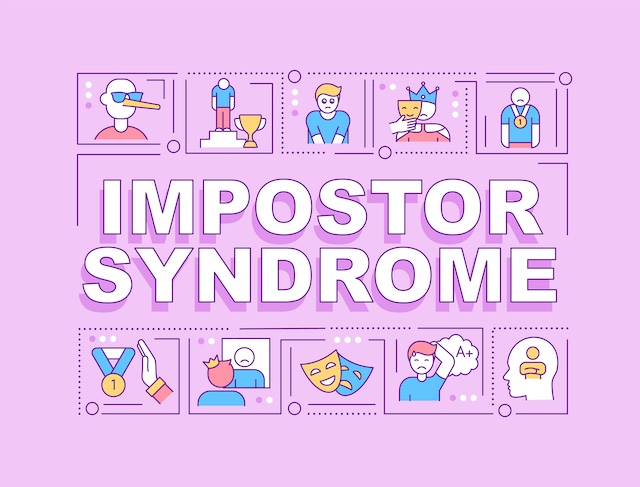Impostor syndrome, a pervasive psychological phenomenon, is more prevalent than you might think. According to an article published in the International Journal of Behavioral Science, impostor syndrome affects nearly 70% of people at some point in their lives. This self-doubt can significantly impact your workforce’s productivity and overall well-being. Imagine a scenario where your employee, despite securing a major project and receiving accolades from colleagues, secretly harbors the belief that they are somehow unworthy of these accomplishments.
In a recent INTOO webinar about impostor syndrome, INTOO coach Dr. Christin L. Roberson spoke to HR leaders about how it reveals itself at work, and ways in which HR and managers can help employees address this struggle.
Employees struggling with impostor syndrome often internalize a fear of being exposed as frauds despite their competence. This constant self-doubt can lead to a pattern of downplaying their achievements, attributing success to external factors rather than their abilities. This ingrained belief in inadequacy can hinder professional growth, limit leadership aspirations, and increase workplace stress and burnout.
What Causes Impostor Syndrome?
Impostor syndrome doesn’t usually come from a single source. Rather, it tends to build over time. Many people learn early in their careers, or even earlier in life, to measure their worth by achievements or by how well they meet others’ expectations. When expectations are high, or someone has been praised mainly for outcomes rather than effort, it’s easy to start believing success is fragile or undeserved. Over time, this creates a habit of second-guessing accomplishments, even when evidence suggests otherwise.
Workplace culture can add to this. Employees who rarely receive direct feedback or who work in environments where only flawless performance is valued may convince themselves that any mistake will expose them. A lack of representation in leadership roles can also play a part; when people don’t see others like themselves succeeding, they may assume they’re the exception rather than fully qualified. All of these factors can reinforce the quiet, persistent feeling of not belonging.
How Can Impostor Syndrome Impact Employees’ Performance in the Workplace?
Impostor syndrome, though often concealed behind a facade of professional success, can significantly impact an employee’s performance in the workplace. The pervasive self-doubt and fear of being unmasked as a fraud can create a range of challenges that stifle career progression and overall job satisfaction.
One major consequence of impostor syndrome is heightened stress. Constantly feeling as though one is on the verge of being exposed can lead to chronic stress, negatively affecting both mental and physical well-being. This stress can manifest as anxiety, sleep disturbances, and other adverse health outcomes, ultimately compromising an individual’s ability to perform optimally at work.
Another detrimental effect of impostor syndrome is reduced confidence. When employees constantly question their abilities and doubt their competencies, taking the initiative, speaking up in meetings, or advocating for themselves becomes difficult. This lack of self-assurance can make them appear less assertive and impactful, affecting their overall contributions and inhibiting their ability to make a significant impact.
Moreover, individuals grappling with impostor syndrome often also have a fear of failure. This fear can feel paralyzing, and prevent them from taking on new challenges or pursuing opportunities that could contribute to their professional growth.
Another common consequence of impostor syndrome is difficulty with acknowledging and celebrating achievements. Even when successful, individuals with this experience downplay their accomplishments, attributing them to external factors like luck or circumstance. This lack of self-recognition can lead to a perpetual cycle of feeling unfulfilled and unsatisfied despite external validation.

14 Ways to Overcome Impostor Syndrome at Work
Overcoming impostor syndrome at work requires a conscious effort to challenge negative thoughts, focus on one’s strengths, and develop a growth mindset. Here are 14 strategies to help employees overcome impostor syndrome and achieve their professional goals:
1. Acknowledge and validate impostor syndrome
Openly acknowledging the realities of impostor syndrome signals to employees that feelings of self-doubt, even among top performers, are typical and expected. No one is immune. Extending emotional validation when an employee expresses anxiety about being exposed as inadequate or fraudulent builds trust. Leaders should avoid denying or debating their inner experiences. Instead, offer empathy and reassurance and praise past accomplishments. This compassionate response fosters relationships where team members know they can confide in struggles without condemnation.
2. Foster a culture of constructive feedback
Nurture a work environment where feedback is viewed as an opportunity for growth rather than a personal attack. Encourage constructive feedback sessions that focus on highlighting strengths and providing actionable guidance for improvement. This approach helps employees recognize their accomplishments and gain valuable insights into areas where they can develop further. By fostering a culture of open and constructive feedback, employers can empower employees to address their weaknesses and continuously improve their skills.
3. Recognize perfectionism
Confront and counter perfectionistic tendencies within the workplace by promoting a healthier perspective on mistakes. Encourage viewing errors as opportunities for learning and growth. Employers play a crucial role in alleviating the undue pressure often associated with impostor syndrome by fostering an environment that acknowledges imperfections as part of the continuous learning process. By addressing perfectionism, organizations contribute to a workplace culture that values progress over perfection, actively combating the self-doubt and unrealistic expectations that can exacerbate impostor syndrome among employees.
4. Encourage mentorship and networking
Foster a culture of mentorship and networking within your organization. Establish formal mentorship programs and encourage informal connections between employees of different levels and backgrounds. These relationships can provide valuable support, guidance, and inspiration to individuals experiencing impostor syndrome. Mentors can offer insights into navigating workplace dynamics, overcoming challenges, and developing professional skills.
5. Set realistic goals
Work collaboratively with employees to set realistic and attainable goals, aligning them with individual skills and experiences. Breaking down larger objectives into manageable tasks facilitates goal attainment and alleviates the overwhelming feelings often linked to impostor syndrome. This approach empowers employees by providing a clear roadmap for success, reinforcing a sense of competence, and mitigating the self-doubt accompanying larger, seemingly insurmountable goals.
6. Celebrate achievements and accomplishments
Consistently celebrating employees’ achievements, irrespective of size, is pivotal for mitigating impostor syndrome. Regular public acknowledgment of contributions reinforces their significance within the organization, highlighting individual strengths and expertise. This intentional recognition fosters a positive work environment and actively combats self-doubt, contributing to heightened self-esteem. By creating a culture that emphasizes achievements, you play a crucial role in shaping a resilient and empowered workforce where employees feel valued and confident in their abilities, ultimately contributing to the organization’s overall success.
7. Provide learning opportunities
Invest in continuous learning and development opportunities for your employees. Offer skill development programs, workshops, and training sessions that add to their strengths and bolster their confidence. This commitment to ongoing learning empowers employees to expand their knowledge and expertise, reducing feelings of inadequacy and fostering a sense of competence. By providing employees with the tools and resources to grow continuously, you can create a culture where a passion for learning and personal development replaces self-doubt.
8. Promote self-compassion
Impostor syndrome often stems from a harsh inner critic that relentlessly scrutinizes every mistake and inadequacy. To combat this:
Encourage a culture of self-compassion within the workplace.
Remind employees that making mistakes is a natural learning process and that growth often arises from stumbles and setbacks.
Foster an environment where employees are encouraged to be kind to themselves, celebrating their achievements and learning from their missteps without dwelling on failures. This shift in mindset can significantly reduce the negative impact of impostor syndrome and empower employees to embrace their imperfections as stepping stones toward growth and success.
9. Lead by example
Openly sharing your own experiences with impostor syndrome can have a deep impact on your company’s culture. By acknowledging your own vulnerabilities and challenges, you create a space where employees feel safe to do the same. This vulnerability fosters a sense of trust and openness, encouraging open communication and collaboration. When employees see their leaders embrace their imperfections and celebrate their successes, it normalizes the experience of impostor syndrome and encourages them to do the same. This shared vulnerability can lead to a collective effort to overcome impostor syndrome and create a work environment that’s more supportive for everyone.
10. Make information about mental health benefits available
If impostor syndrome has gone beyond self-doubt and is causing significant distress, impacting an employee’s daily life and mental well-being, make them aware of the help available to them. Employee Assistance Plans (EAPs) and other benefits often offer a form of counseling that can be advantageous in such situations. A mental health professional can provide expert guidance and support to address the underlying causes of the employee’s impostor syndrome and develop effective coping mechanisms. They can help one identify and dismantle negative thought patterns, cultivate self-compassion, and build stronger self-belief. Impart to the employee that seeking help is a courageous step towards reclaiming confidence and achieving full potential.
11. Offer 1:1 career development coaching
Personalized coaching gives employees a place to sort through the doubts they might never mention to a manager. A coach can help them step back, look at their accomplishments more objectively, and understand what’s driving their self-doubt. Conversations like these often uncover strengths employees didn’t realize they had.
12. Have routine conversations about growth
Instead of focusing only on finished successes, create moments where leaders and employees can talk about the messy parts of learning, such as projects that took a few tries, skills they’re still developing, or mistakes that taught them something. These conversations go a long way in breaking the illusion that everyone else has everything figured out.
13. Create peer support or affinity groups
Sometimes the simplest reassurance comes from realizing you’re not the only one feeling this way. Peer groups or employee resource groups can provide that sense of community. When employees have a space to share experiences, they often become more comfortable acknowledging their own strengths and asking for help when they need it.
14. Encourage self-reflection habits
Quick weekly check-ins, whether through journaling, notes to oneself, or a simple “wins” list, can help employees notice progress they’d otherwise overlook. These habits are especially useful for people who tend to dismiss their accomplishments when they happen.
Conclusion
Impostor syndrome creates an internal tug-of-war, where outward success clashes with an internal narrative of unworthiness. The phenomenon transcends mere self-critique; it becomes a formidable barrier to recognizing one’s true potential and embracing opportunities for growth. As an employer, understanding and addressing impostor syndrome is crucial for fostering a thriving and supportive work environment. By implementing the strategies outlined in this article, you can create a culture where employees feel empowered, valued, and encouraged to reach their full potential.
With INTOO’s experienced coaches and trainers, employees at every level can build the confidence they need to overcome impostor syndrome. Through personalized one-on-one coaching, leadership development programs, and interactive workshops, your people gain the tools to recognize their strengths, trust their abilities, and thrive in their roles. Contact us today to learn more.











